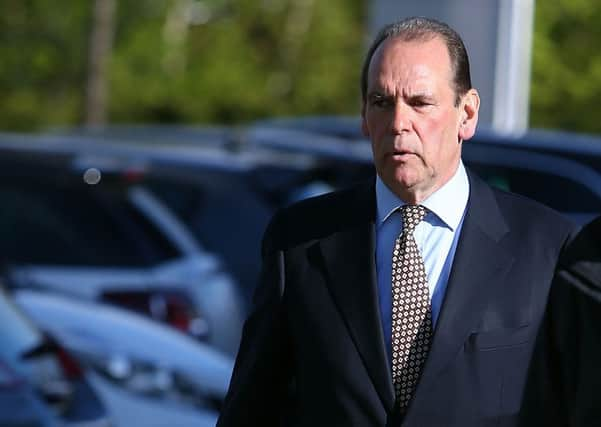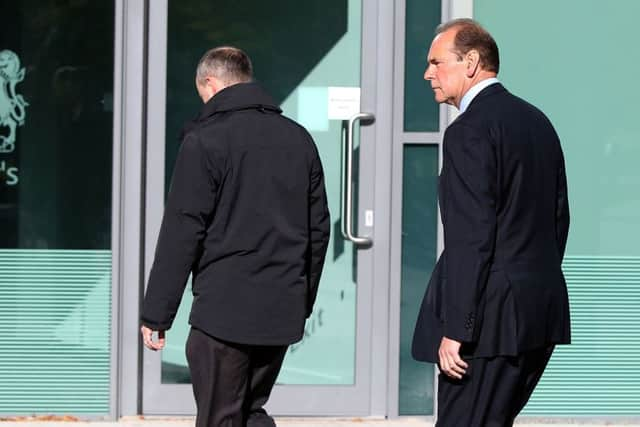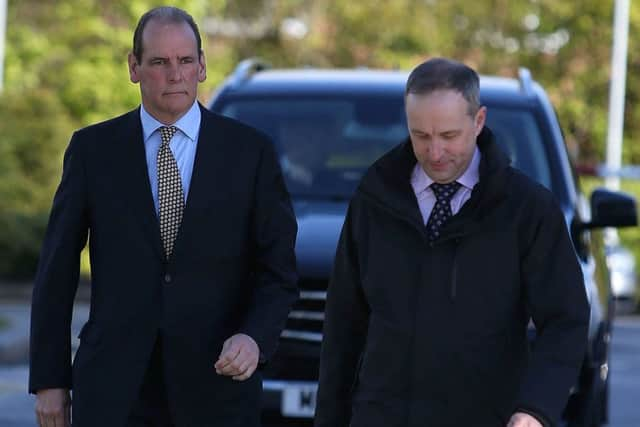Ex-police chief Norman Bettison ‘plotted in pub to blame Liverpool fans for Hillsborough disaster’


A month after the April 1989 disaster, the former chief constable of West Yorkshire and Merseyside police forces was said to have made the comment to a civil servant in the Fleur de Lys pub in Sheffield.
John Barry said he and Sir Norman, a chief inspector with South Yorkshire Police at the time, were among a group of people who would go to the pub following a business course they both attended.
Advertisement
Hide AdAdvertisement
Hide AdThe court also heard today from another student on Sir Norman’s business course claiming the retired officer had, in a separate conversation, told of being put on an internal team tasked with making sure “drunken Liverpool supporters” were blamed.


But during his evidence, Sir Norman denied the claims by both men and said the comments ascribed to him he would not make “in a private or public situation”.
Mr Barry told the jury in Warrington that both had just got a pint and moved away from the bar when Sir Norman told him: “I have been asked by my senior officers to pull together this South Yorkshire Police evidence for the (Taylor) inquiry and we are going to try to concoct a story that all of the Liverpool fans were drunk, and that we were afraid they were going to break down the gates so we decided to open them.”
Sir Norman is due to be questioned later today about his role on the day of the fateful FA Cup semi-final, where 96 Liverpool fans died, and his subsequent involvement in gathering evidence for the Taylor Inquiry which began the month after the disaster.
Advertisement
Hide AdAdvertisement
Hide AdThe jury has previously heard evidence from a former South Yorkshire Police (SYP) colleague of Sir Norman that they both attended a briefing the Monday after the tragedy and were told to put the blame on Liverpool fans.


Last week, former detective chief superintendent Terry Wain denied he held any such briefing.
Mr Wain compiled a report for Lord Justice Taylor on behalf of SYP, which was later edited, and included a section on the events of the day which was written by Sir Norman.
This afternoon, another fellow member of Sir Norman’s business course claimed he revealed plans to deflect blame for the tragedy from South Yorkshire Police in the days after April 15, 1989.
Advertisement
Hide AdAdvertisement
Hide AdMark Ellaby said Sir Norman made the comments after a session of the MBA course on April 17 during a conversation about the cause of the disaster where four or five other people were present.
He said: “I remember Mr Bettison saying he had just been seconded to an internal team in South Yorkshire Police who were tasked with making sure that South Yorkshire Police bore no blame for the Hillsborough disaster and it was all the fault of drunken Liverpool supporters.”
He added: “We were a bit surprised he said what he said. I was left with the conclusion that it was an internal group around covering up the role that South Yorkshire Police had in the Hillsborough tragedy.”
Mr Ellaby added that he had the impression Sir Norman saw his role in the internal team as a “positive career advancement”.
Advertisement
Hide AdAdvertisement
Hide AdHe said: “It was clear he was being groomed for senior leadership. He had been on a number of career development courses and the MBA was part of that process. I know that he was ambitious.”
Sir Norman denied the claims made by his two fellow business students when giving his evidence later.
Describing the conversation on April 17 in the pub after a session of the course, he said Hillsborough was “the point of discussion in every bar and cafe throughout Sheffield”. He added that at this point he had not been given his evidence-gathering role.
He told the jury: “There was an awful lot of people in conversation who didn’t know the correction to the lie about the opening of the gates. I can recall that I talked about it definitely being at the police’s direction.
Advertisement
Hide AdAdvertisement
Hide Ad“I recall that I had learned, but I don’t think it had reached public consciousness, that West Midlands Police were going to undertake an independent investigation.
“There was a wide-ranging debate, much without sufficient knowledge and understanding, around the room about the potential cause of the disaster.
“I recall there were people in the conversation who had extreme views about football fans in general and on this occasion and probably without evidence to back that up. It was a typical bar-room conversation.
“I did offer the view that there may be a reason why the gates needed to be opened, but that was as far as it went.”
Advertisement
Hide AdAdvertisement
Hide AdWhen asked if he had blamed the Liverpool fans during the conversation, he said: “I don’t think the precise words can be reached after 26 years. I remember I was attending as a student and also a professional police officer. Some of the comments that have been ascribed to me I would not make in a private or public situation.”
Describing the events of April 24, Sir Norman said that by that stage he had realised he would not be able to attend the course for several weeks because of his role gathering evidence about the disaster.
He said he went along to explain to other people on the course why he wouldn’t be attending, but that on that date he was “even more circumspect in what I said”.
He said Mr Ellaby’s recollection of what he said may have “conflated” the conversation on April 17 with the announcements he was making “here, there and everywhere” on April 24 about his impending absence.
Advertisement
Hide AdAdvertisement
Hide AdWhen asked whether he had made the claims as described by Mr Barry, he replied: “I didn’t say anything like that.”
He was then asked if he had made the comments described by Mr Ellaby. that he was part of a team tasked with blaming Liverpool fans. He replied: “I didn’t say that and when I heard him give his evidence, he seemed to say he inferred that from what I was saying.”
During questioning by Paul Greaney, representing the Police Federation, Mr Barry, who was at Hillsborough at the time of the tragedy, refuted the suggestion that his “traumatised state” at the time of the alleged comments caused him to “remember Norman Bettison saying things that he never actually said”.
He said: “No I don’t accept that at all. I know exactly what he said. I remember it quite clearly. I can still see him standing there and telling me.”
Advertisement
Hide AdAdvertisement
Hide AdMr Greaney put to him that Sir Norman attended the course on April 17 and 24, 1989, but then announced that he would not be attending because he had been seconded to the Hillsborough investigation.
He claimed that Sir Norman didn’t attend a class during May or June and put it to Mr Barry that he was not in a position to make the alleged comments about the plan to blame Liverpool fans.
Mr Barry replied: “I am convinced he did attend at least one class where he went to the pub afterwards and said what he said. I am convinced that was some time in the weeks following May 8.”
He went on to say: “I have absolutely no doubt about my recollection of the events and I don’t think the fact I was traumatised has any bearing on what happened.
Advertisement
Hide AdAdvertisement
Hide Ad“I have absolutely no doubt about Norman Bettison making that statement to me in the pub one evening after class. I can remember it quite clearly.
“The reason I can remember it now as clearly as on the evening he told me was that I went home that evening and I turned it over and over in my mind for days and weeks and months afterwards, because I was so shocked and staggered at the import of what he had said.
“I turned it over and over in my mind trying to understand why he had said it, what I should do with the information, but I repeated his statement over and over in my mind for a long time afterwards.
“I went home, I drove home repeating that statement to myself, went to bed that night repeating that statement to myself and repeating it to myself for days and weeks afterwards.”
Advertisement
Hide AdAdvertisement
Hide AdMr Barry said during questioning that it was his view that any injustice about Hillsborough should be put right, and that he made a contribution to the cost of the victims’ families’ private prosecutions.
Mr Greaney said to him: “I am not in a position to say whether you have made up your account to support a cause that you believe in deeply or whether in some way you have come to make a dreadful mistake but I am in a position to suggest the simple fact is that you are wrong and that Norman Bettison never said to you, or anyone, that there was a plan to blame the fans.”
Mr Barry replied: “I don’t know why on earth I would have made up what I am reporting Norman Bettison to have said. I don’t know why on earth I have done that, what was I going to get out of it? I simply don’t understand.”
Mr Barry did not give evidence to the Taylor Inquiry or the original inquests but approached the Hillsborough Family Support Group in August 1998 when he read that a private prosecution was being brought against match commander David Duckenfield and his senior colleague, Bernard Murray.
Advertisement
Hide AdAdvertisement
Hide AdHis information was ultimately not used in the private prosecution, the court heard.
In 2009 he contacted Maria Eagle MP after reading a newspaper article about comments she had made in the House of Commons naming Sir Norman as “being involved in a black propaganda unit, was the expression she used”.
Discussions took place as to whether he would tell his story to the Press, but he chose not to.
But the pub conservation was eventually relayed in Parliament by Ms Eagle following the September 2012 publication of the Hillsborough Independent panel report, and he went on to give media interviews.
Advertisement
Hide AdAdvertisement
Hide AdMr Hough said to Mr Barry: “You are aware that Sir Norman Bettison has denied the words that were attributed to him and that he continues in that denial?”
“Yes,” replied Mr Barry.
Mr Hough said: “It might be said that the words you attributed to Norman Bettison would have been very foolish words for him to speak. Words that could, if made public, threaten his career. Would you accept that?”
Mr Barry replied: “That is correct.”
Mr Hough said: “What would you say to the suggestion that it was rather odd for him to say those words to somebody he did not particularly know well?”
The witness said: “It was odd. I was very very surprised. I couldn’t understand it.”
Advertisement
Hide AdAdvertisement
Hide AdAsked why he had not come forward with his information nearer to the time of the disaster, he said: “I wish that I had gone to the Taylor Inquiry with it but I think there are several reasons that I have explained why I did not ... I mean just the shock, the trauma I was going through in the months afterwards and the isolation.”
He said he did not and had never held a grudge against Sir Norman.
Mr Barry agreed with Paul Greaney QC, representing the Police Federation, that he had been describing what amounted to Sir Norman “announcing to you that there was to be a cover-up and having done so there was not another word”.
Mr Greaney said: “For all he knew you were part of the group that was to be blamed in the cover-up?”
“Yes,” said the witness.
Advertisement
Hide AdAdvertisement
Hide AdThe barrister continued: “Can you understand why it might be thought, to say the least, not at all likely that an intelligent and experienced police officer should admit to you behaviour that was, at the very least, career ending?”
Mr Barry said: “I would have thought it unlikely if anybody had put the suggestion to me. It was unlikely but it happened. What I said is what happened.”
The witness agreed that he had been and continued to be “deeply affected” by his experiences at Hillsborough.
Mr Greaney asked: “What I want you to consider is whether you are able to accept, Mr Barry, the real possibility that your traumatised state at the time has caused you to remember Norman Bettison saying things that he never actually said.”
Advertisement
Hide AdAdvertisement
Hide AdMr Barry replied: “No, I don’t accept that at all. I know exactly what he said. I remember it quite clearly.”
Mr Greaney put it to the witness that Sir Norman announced to the business class on April 24, 1989 that he would not be attending again “for the foreseeable future” because he had been seconded by a team working on the disaster.
And in contrast to Mr Barry’s recollection that the pub comment was made in mid to late May, Sir Norman - according to Mr Greaney - had in fact not attended a single class that month and did not return to the course until July 1989.
Mr Barry said that did not cause him to doubt his recollection of events.
Advertisement
Hide AdAdvertisement
Hide AdHe said: “I have absolutely no doubt of my memory of events and I don’t think that the fact I was traumatised had any bearing of my memory of what happened.”
Mr Greaney asked if he supported the ongoing cause of the Hillsborough families.
He said: “I support the cause of getting to the truth of what happened. I don’t have a particular axe to grind in terms of the Hillsborough families.
“I know my part in it, which is relating what Norman Bettison told me and that happened to be in line with what the Hillsborough families and others have been saying for some time. But I’m not particularly rooting for the Hillsborough families or anybody else. I’m simply relating what Norman Bettison said to me.”
Advertisement
Hide AdAdvertisement
Hide AdHe said he had made a financial contribution to the private prosecution by the Hillsborough families.
Mr Greaney said: “I am not in a position to say whether you have made up your account to support a cause that you believe in deeply or whether, in some way, you have come to make a dreadful mistake.
“But I am in a position to suggest that the simple fact is that you are wrong and that Norman Bettison never said to you, or anyone, that there was a plan to blame the fans. That’s my suggestion to you, Mr Barry.”
Mr Barry replied: “I don’t know why on earth I would make up what I’m reporting Norman Bettison said. I simply do not understand. I have sworn the oath and told the truth. I will stand by that.”